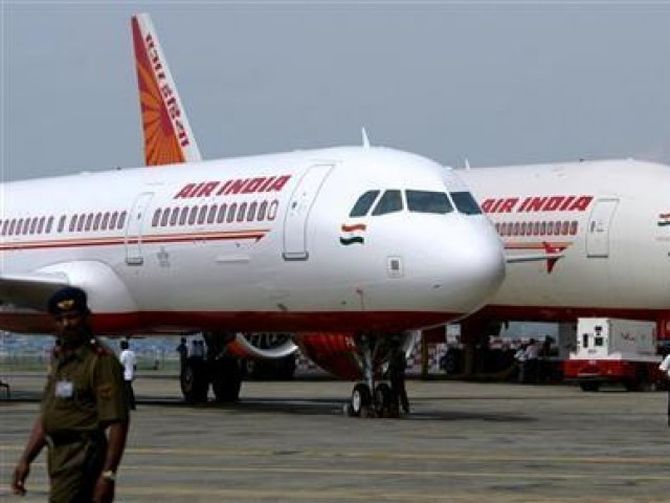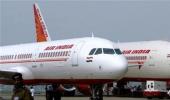'It's too big to digest as one whole airline.'

"There is going to be no one airline for which Air India is going to be a perfect fit for," Aviation expert Ajay Awtaney, founder editor, LiveFromALounge.com, tells Prasanna D Zore/Rediff.com.
How is the 2018 divestment of Air India different from the 2020 divestment?
In 2018, only a 74% stake was on offer. The government was going to retain the rest and perhaps cash it out later. Now, the government is happy to sell out the entire 100% in one go.
In 2018, there were requirements that the network of the consortium would be at least worth Rs 5,000 crore (Rs 50 billion). This time, the network of the buyer or the consortium has been brought down to Rs 3,500 crore (Rs 35 billion).
In 2018, the government wanted the acquirers to take on a debt burden of approximately Rs 33,392 crore (Rs 333.92 billion). This time, the fixed debt amount has gone down to Rs 23,286 crore (Rs 232.86 billion).
The remaining part of the debt will be spun off to a holding company and the buyer does not need to worry about this extra debt.
Now, only the aircraft related debt that was incurred by Air India over a period will be transferred to the buyer.
What made the government change these terms of sale?
This change has come learning from past experience. The biggest feedback they got the last time around was that if somebody wanted to acquire Air India they do not want a silent shareholder around. An acquirer would be interested more in the whole piece.
The residual stake of 26%, which the government wanted to retain in 2018, was very significant. Industry gave them feedback that was not something to go for. And that has changed this time around.
Potential bidders wanted 100% management control?
Yes.
Why does the 2020 divestment of Air India makes it attractive to potential bidders?
Attractive or not, we will find out when the expression of interest stage is reached. Right now, nobody knows the names of those expressing interest, or bidding for Air India.
In terms of what makes it attractive this time around is that the there will be lesser burden on whoever might acquire the airline.
You are basically handing out the entire management control and the entire group network as well.
There are lot of ifs and buts in the whole situation that the buyer would have to watch out for.
How will the divestment process proceed?
At this time, there is no complete visibility on the entire process, but what we know is that at the expression of interest stage, airlines or a consortium of people will send a memorandum to Air India or to the government saying they are interested in buying Air India.
At that point of time, they will have to provide a set format of everything that the government asks for including the letter of forming a consortium, their net worth documents and whatever else the government requires. A fairly lengthy list that could be.
After that, all these expression of interests would be vetted. Then the government will come to a final list of people they will engage with further on the divestment process.
That will be called the Request For Proposal stage. At that point of time people who have been vetted by the government will submit their final proposal which will include how much they are willing to pay and what conditions do they want fulfilled. It will be like a dialogue.
The government will meet each party and hear them out.
If something material fructifies, then the next stage is the transaction stage where the government gets the transactions vetted and then decide the best suitor for Air India.
Then would come the stage of collecting cash and transferring the title of Air India to whoever emerges as the winner.
It will be a three-stage process.
What are the assets and liabilities that the winner would get?
The assets you get are the rights to use all the slots that Air India has, all the bilaterals that Air India has from the India quota with various countries around the world.
You are getting all the aircraft apart from the three or four 747s that would be kept aside which are usually not flown or used for VIP duties.
You are going to get the entire workforce and the $3.2 billion debt.
What the buyer will not get are some permanent Air India buildings like the one at Nariman Point (south Mumbai), its current headquarters in Delhi. You will also not get access to the airline's art collection.
The focus this time is on selling the core airline only.
What the government has put out on offer is 100% of Air India, which is the domestic and international carrier; 100% of Air India Express, a subsidiary of Air India.
Air India Express operates largely between India, the Middle East and Southeast Asia. It's a low-cost carrier with 25 aircraft.
Air India has a ground and cargo handling unit, AISATS, a joint venture with Singapore Airlines. The 50% owned by Air India is also on sale.
Apart from the $3.2 billion debt that the potential bidder will take over, will it have to pay any other amount to the Government of India?
That's what we will find out at the stage when the proposals are opened; then will we come to know how much is any potential bidder willing to pay for the airline.
You are going to take on $3.2 billion of debt apart from whatever money you are expected to pay to the Government of India to acquire Air India.
After that, you put in money in the airline where you want to upgrade or restructure.
For instance, if after the acquisition, you want to do a restructuring of the workforce, then you might want to offer them a voluntary retirement scheme.
Any rough estimate about the valuation of Air India apart from the debt part?
Not at the moment, unfortunately, because the only thing that the government reveals in the expression of interest is a one-page balance sheet. I don't think valuations are coming out at this stage.
I also don't think it is fair that there is a number that is floating around because each group or each individual airline would estimate the airline's net worth on their own with their own accountants and transaction advisors. This will be kept inside the envelope till concrete proposals come on the table.
As an aviation expert, what is your estimate about a fair value for Air India?
I don't have an estimate. Like I said, the data is too less to make an estimate. Some of the biggest assets with Air India are its intangibles.
Let's say you had $3 billion today to start an airline.
You could say I will take over Air India along with its readymade network and everything else that comes with it.
Or you could say I'm going to buy or lease modern aircraft, wait for slots to be given to me and build an airline from scratch rather than acquire an airline which has been around for a very long time.
This sale has its good parts and it has problems that come with it.
How much money would a new operator require to build an airline like Air India?
Billions of dollars. There is no clear number because airlines buy aircraft and aircraft pricing is always kept confidential between the manufacturer and the buyer.
The list price of an aircraft could be $100 million, but as you are buying hundreds of them, you could get them at $56 million apiece. Or if you are buying only ten aircraft, you could get it at $90 million a piece.
Which airlines will find Air India's assets as the best fit to scale up their operations?
The name of the Tatas is being floated around again. Obviously, they have an emotional attachment to the airline because they were the ones who founded the airline.
So, maybe the Tatas will bid, maybe not. They were also talked about when the bidding for Jet Airways happened one-and-a-half years back. Eventually, they did not go through with that.
The Tatas will consider Air India a good fit because their domestic fleet is all A320s which is the same as the fleet that the Tatas's Vistara and Air Asia India operate at this point of time.
Indigo had evinced interest in buying Air India's international operations two years ago, so we'll see if they come in the fray this time or not.
There is going to be no one airline for which Air India is going to be a perfect fit for.
If you consider the stage that the market is in at this point in time, 80% to 85% of India prefers to fly on a no-frills airline. The rest prefer flying on full-service airlines domestically.
An Indigo, obviously, would just want Air India's international operations because they already have the biggest domestic operation at this time.
Different businesses of the airline will be interesting to different bidders.
Is Air India available in bits and parcels?
Unfortunately, no. That is not what the government has made it out to be.
But maybe somebody will say we just want to bid for a part of it. Till now, no negotiations have happened with any party, but the government wants to sell 100% stake in Air India.
What challenges could the government face in its bid to sell Air India?
The challenges remain the same as they were the last time around.
It's too big to digest as one whole airline.
The government needs to be open to listening from industry which the government said it will do going forward.
The challenge is the huge size of Air India. It's too big to digest as one whole airline.
While Air India has a great global group network, the aircraft that form its underlying assets are older technology.
To give you an example, if you look at the information memorandum, you'll see most of the aircraft -- A320s, A319s, A321s -- that Air India owns are of the classic variety.
About four-five years ago, Airbus launched the A320 Neo which gives you 15% lesser fuel burn and saves 15% on fuel cost on every flight.
Air India's A320 Neos are leased and Air India pays rent for the lease. The aircraft that Air India owns are now approximately 10 years old. I'm not really sure what the secondhand valuation will be now because most operators now prefer to fly the A320 Neo.
A prospective bidder may point this out and question why they should be saddled with debt used for buying old aircraft. A320 Neos are leased from other companies and so can't be considered as assets.
Another thing that must be highlighted at this point of time is that all government officials are mandated to fly Air India.
As per the Finance Bill 2009 an official on government duty is expected to only fly Air India. The memorandum says that once the transaction is completed, this is not a guarantee anymore.
So, the winner of the bid may lose the government, which is currently a big customer of Air India. This guarantee should have continued for a few years, like a lock-in period.
By one report, the government owes Air India some $30 million in dues indicating that this business is worth millions of dollars if not less.
Also, the only constraint set out is that the control of the airline will need to be owned by an Indian management.
Say, if a US-based hedge fund wins the bid and considers to move the headquarters to the US, that can't happen.
The company will continue to remain Indian and run according to Indian laws.











 © 2025
© 2025